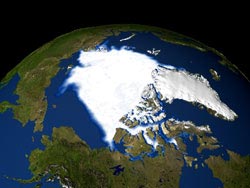Humpback likely born along Madagascar traveled to central Africa, says WCS researchers
For the first time ever, a genetic study has followed a single humpback whale from one ocean basin to another, adding to traditional notions of the migratory patterns of these majestic marine mammals in the process, according to researchers from the Wildlife Conservation Society (WCS), the American Museum of Natural History (AMNH), and New York University. In the most recent Royal Society’s B

A new NASA-funded study finds that predicted increases in precipitation due to warmer air temperatures from greenhouse gas emissions may actually increase sea ice volume in the Antarctic’s Southern Ocean. This adds new evidence of potential asymmetry between the two poles, and may be an indication that climate change processes may have different impact on different areas of the globe.
“Most people have heard of climate change and how rising air temperatures are melting glaciers an
Marine environments around the world are being threatened by exotic species of the moon jellyfish being dispersed by international shipping, according to new research.
Using genetic data and computer simulations of ocean currents and water temperatures, researchers from the University of New South Wales and the University of California, Davis, have revealed that the moon jellyfish could not have migrated naturally, according to a report in today’s Proceedings of the Nationa
There are four wings to the Earth Science building of the Goddard Space Flight Center (GSFC) in Greenbelt, MD. But on August 8, “we added a virtual fifth wing,” says NASA Emeritus Scientist Milton Halem. That new wing used experimental OptIPuter software to create a ’high-performance collaboratory’ with the University of California, San Diego’s Scripps Institution of Oceanography, which allowed scientists to establish high-definition telepresence while also collaborating in real
The illegal mining of corals off the southwest coast of Sri Lanka permitted far more onshore destruction from the 26 December2004 tsunami than occurred in nearby areas whose coral reefs were intact. This is the principal finding of a team of researchers from the United States and Sri Lanka who studied the area earlier this year. Their report is published in the 16 August issue of Eos, the newspaper of the American Geophysical Union.
Some of the differences were startling. Lead aut
Heavy rainfall and flooding from Typhoon Matsa killed at least 12 people and caused millions of euros worth of damage in China. In Matsa’s aftermath, unique data from ESA’s ERS-2 spacecraft reveal the interior wind fields powering it at its height.
China’s ninth typhoon this year, Matsa first came ashore at Yuhan County in Zhejiang Province on 6 August, with reported winds up to 250 kilometres per hour. Matsa brought heavy rains and serious damage to several coast